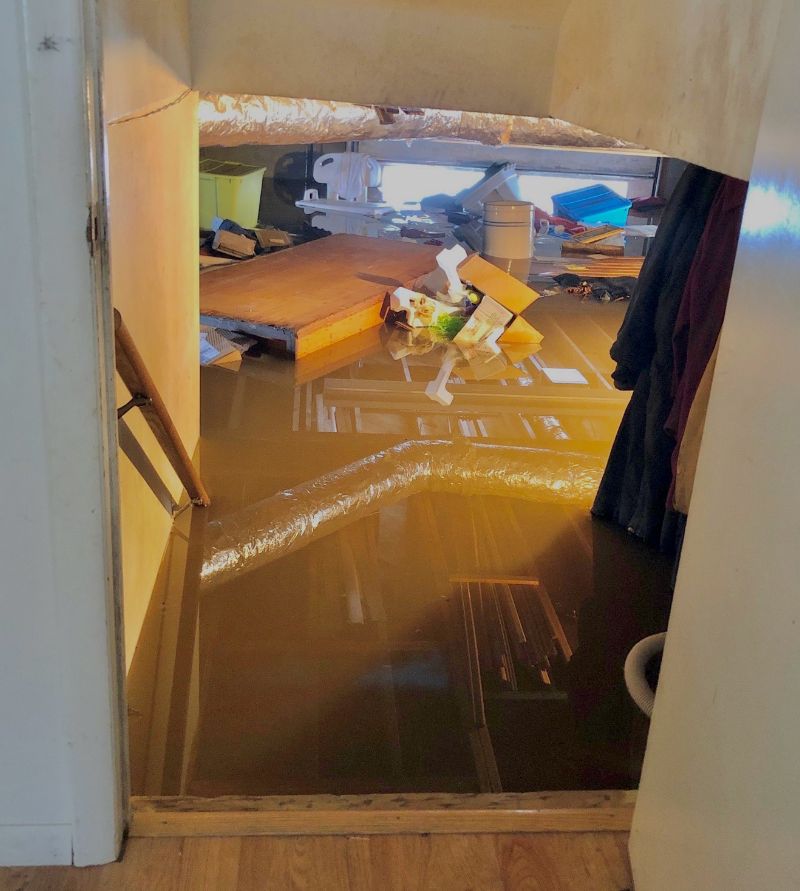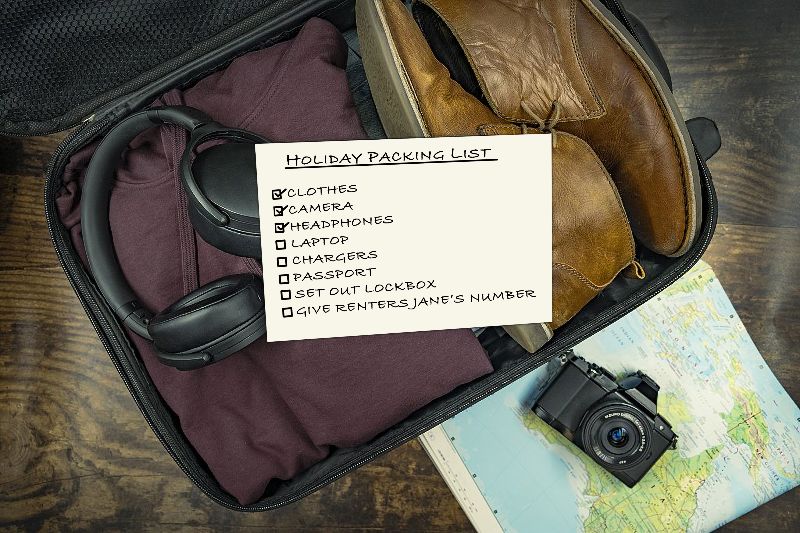How to Wisely and Securely Take Time Away from Your Rental Business
. Posted in News - 3 Comments
By Eric Weld, MassLandlords, Inc.
Landlords need vacations too. But how do you take time away from a business that is fraught with so much unpredictability? In an industry that combines people and houses, circumstances can change any second, and your attention can be called for any hour of any day. Putting out fires – mostly metaphorical, but sometimes literal – comprises an important percentage of a small housing provider’s job.

Sipping cocktails on a tropical beach while collecting rent can provide essential rest and relaxation, as long as you plan well for your absence and appoint a backup manager in your stead. Image: CC BY-SA 123rf
The good news is, taking a break from the volatility of this business can be done. But it requires a good share of forethought and planning. Whether you’re a landlord or not, leaving your property for weeks at a time carries some risk: vulnerability to break-ins and vandalism, untimely malfunctioning of house systems and appliances, the weather.
If you are a landlord, that risk is multiplied as you add in people living in and on your property. In some cases, the source of risk could even be your renters. If you have a tenant that is inclined to misbehave, they might be more apt to do so if they know you’ll be away.
And no matter what your break consists of – whether it’s remaining in town on a mental health “staycation,” sipping Mai-tais on a tropical beach or playing Indiana Jones searching through cobwebs in Egypt for ancient artifacts – you are still responsible for the code-adhering safety and function of your tenants’ dwellings. You’re also partly responsible for overseeing the smooth communal living of all your tenants, and making sure bills are paid, rents are collected, grounds are kept and vendors are met.
How does a mom-and-pop (i.e., non-corporate) landlord step away from this range of responsibilities with some peace of mind so they can relax and recharge?

A flooded basement like this one can be a landlord’s worst nightmare, and it’s ten times worse if you went on vacation several countries away and didn’t appoint a backup manager.
Virtual Landlord?
Some might argue, in this day of global interconnectivity, that it’s possible to manage rental properties from afar. Tenants have your contact information. If anything arises, they know to call you. You can communicate and schedule with vendors, groundskeepers and your tenants online, via phone and through email, just as you would at home. Contractors can video call and show you exactly where a leak is occurring.
In theory, remote landlording can work. As long as you have a cell signal, it’s conceivable to manage rental properties from anywhere in the world. Rent collection software, like RentHelper, automates that process. Some landlords have even posted comments online about handling emergencies as urgent as water pipe leaks from thousands of miles away, especially if, wisely, they had automatic leak shut-off valves installed. No need to appoint a backup manager, they counsel.
It could work. But is it advisable?
Operating a rental business without having a backup property manager or other designee available locally is highly risky. Cell signals aren’t always dependable. And if you’re several time zones afield, you could be getting phone calls at odd hours when you’re asleep, or when your vacationing mental state is altered by whatever is legally available where you are.
At other times, someone may need to be on the rental premises to let a repair technician into a unit. Or what if your snowplow person fails to show up on a stormy morning, you can’t reach them, and your tenants need to get to work? If a water line breaks and you get a frantic call that water is pouring into the basement, would you really want to be a 10-hour flight away, without a go-to person to contact? Imagine the stress waiting in a long line at airport security while your property is flooding because no one is there to shut off the water.
Then there’s the people factor. A dispute between or among tenants can quickly escalate without deft intervention. Phone calls to tenants from another time zone or country might not be sufficient and could turn into a morass of jumbled misinterpretations exacerbating the problem. And managing lease terminations and transitions to new tenants, including screening, from a distance seems untenable.
Some businesses lend themselves to remote management. As long as you have a cell signal and a phone, you could conceivably maintain business functions from thousands of miles away as a stock trader, consultant, web designer or a virtually based landlords association.
Some might add landlording to that list. But renting homes to people is, in many ways, still a hands-on business.
Someone You Can Trust
That said, you can certainly take time away from your rental business. But, just as you wouldn’t leave your home without appointing someone you know and trust to look after it, you also should not leave your business, even temporarily, without assigning a backup manager.
It’s the first step in planning to be away from your business.
Many mom-and-pop landlords are able to appoint family members as fill-ins while they’re away. A spouse, if they’re not traveling with you. Your adult child or children, parents, or other relatives. Family members can work well because they have a personal connection to the property and may look after it more assiduously. (Added bonus: they might fill in for free.)
Many landlords make acquaintances with other landlords after some time in the business. MassLandlords’ series of events is an ideal way to network, meet other landlords and build a support system.
It can work well to enlist your other landlord friends to watch over your properties while you’re away. Fellow landlords make exceptional backup managers because they know the business, what to watch and be ready for, how to work with tenants, and when things typically happen. As a business arrangement, you could offer to exchange the favor when they want to skip town for a stint.
It’s ideal when your replacement manager is familiar or experienced with the landlord-tenant business, but it’s not absolutely necessary. If you have a trusted and willing friend who has no landlord experience, you could appoint them to handle minimal oversight, especially if you only plan to be gone for a few days, and not very far away. They could act as point person for minor issues, such as letting in vendors or receiving deliveries, but would contact you with anything pressing. (Of course, you would never ask an untrained person to screen tenants, handle security deposits, lease a unit or handle other types of heavy lifting.)
The main point of assigning a backup while you’re away is to know that someone you trust is on hand, keeping an eye on your rentals and tenants, and letting you know if something needs your attention.
Hiring a Manager
Finally, for those who plan to, or would like to, head out of town frequently and don’t have family, friends or others that they feel they can trust, hiring a permanent property manager might be the best option.
Especially if you have a growing rental business with several units and more planned, hiring a manager will free up your time for long-term strategizing. Instead of spending so much of your time on the day-to-day operation of the business, you could focus on watching for and purchasing more properties, procuring funding as needed, and supervising your growing management team. And with a property manager in place, getting away will be less stressful and more enjoyable.
Hiring a permanent manager also allows you to establish a relationship of trust with the person overseeing your rentals, which will save you untold time and effort over the long run.
Prepare Your Backup Manager
Once you have a backup property manager in place – a permanent hire or temporary appointee – you’ll need to take two more steps.
The first is to provide your backup with everything they will need in your absence. That includes your contact information and some kind of itinerary. It’s especially important for them to know where you plan to be in case you’ll be visiting locales with potentially weak cell signals or going off grid for spells.
Also provide them with 1) a spreadsheet of all your tenants, their unit numbers and phone numbers, and names of all people living in the unit; and 2) a list of preferred vendors with contacts, ideally with notes about their past work for you. As you’re building those lists, always include two important vendors: a plumber and an exterminator. Problems addressed by both of these vendors can get much worse very quickly if not serviced in a hurry.
Other information to pass on to your backups might include a company credit card for paying vendors, a sample rental agreement, property rules, keys or access to keys for every rental unit, and any rent collection instructions if they’ll be handling that task.
You might also provide tips about certain tenants and any special issues to be aware of. And ask your backup to keep a log of what took place while you were away, and details of interactions with tenants, so you are well-apprised when you return.
Letting Tenants and Others Know
The second step before leaving is to let your tenants know you will be gone. This can be done via a group communication, like an email or a note in their mailbox. It’s not necessary to pinpoint the exact dates you will be away. In fact, in some cases, it may not be advisable if you have tenants who might take advantage of your absence by, say, throwing a massive kegger. You can keep the details vague regarding where you will be and for how long.
In that communication, be sure to include the name and contact information of the person you’re leaving in charge. Let tenants know to call your fill-in in case of any issues (implication: don’t call you while you’re on vacation). If necessary, you could tell them, your fill-in manager will contact you.
In the event you’ll be away during rent collection, remind your tenants that rent will be due on the regular schedule, and payable in the usual manner. If you take cash, ask them to set the cash aside for you in an envelope, to keep their budget on schedule. You will collect it when you return.
If you have a go-to handyman or handywoman or other regular vendors, you might consider also informing them that you will be away and that they may receive calls or requests from your backup person. You could even consider writing a note to your vendors granting your fill-in authority to place orders or schedule service, to remove any uncertainty they might have.

Among tasks you can do now is creating a packing list so that it will be ready and accessible when you’re planning to leave. Image: cc by-sa familydestinationsguide.com WikiMedia Commons
Put it in Place in Advance
Vacations and professional conferences can be planned in advance, allowing you time for putting all these steps in place. But sometimes you might be called out of town in a hurry, like a family emergency, an unfortunate illness or sudden death of a family member.
When that happens, it’s best to have a plan already in place. Before it is necessary, set up as many of these steps as you can for when they are needed. Establish a go-to person that will act as your backup when the need arises. If you haven’t already, create lists of vendors and tenant information, saved on a spreadsheet that can be easily updated. Make printed copies of these lists and post them somewhere visible. Devise a packing list now that you can quickly access when you plan to, or are called to, leave town.
Get a lockable key box and put copies of all unit keys in it, as well as keys to any storage sheds, basements or gates. Key boxes, or key cabinets, are typically made weatherproof, and close and latch with a secure key lock. If you don’t want to leave the box out in view, put a reminder on your packing list to either set it out or give it to your backup manager when you leave.
It also wouldn’t hurt to let your tenants know in advance who your backup person will be in case you are not available.
Sometimes you can’t avoid having to leave town, and at those times it’s essential to have a plan in place. Also, things can happen unexpectedly, and you could end up being away longer than you’d planned. Maybe a family emergency detains you at a remote location. Or you arrive at your vacation home to find it needs repairs, keeping you there longer. With an away plan in place, you’ll be much better equipped to deal with surprises.
Vacation Timing
As a landlord, there are better times to be away than others. If you are able to choose and plan the time of year, or of the month, that you will go away, there are a couple considerations.
For example, if you know you have tenants with leases ending soon, it might not be the best time to take a vacation. You’ll probably want to be present for final business like inspecting the rental unit for any damages, and handling the return of any security deposit due. And whether or not you have a new tenant lined up, you’ll want to be around for collecting and depositing move-in monies like last month’s rent and security deposit, and for tending to any move-in issues. If you’re seeking a new tenant, you will be screening applicants. And unless you have a network lock, you or your backup will need to be present to hand over unit keys to your new renter.
Also, if you handle rent collection, the first of the month might be a time to avoid being away. Some landlords might feel secure leaving rent collection to another person, but it may need your intervention if a tenant pays late or not at all.
As for times of the year, every season has its landlord challenges. Summer brings severe rain, thunder and lightning storms that can cause damage and need immediate attention. Winter snowstorms require timely clearing of walkways and driveways. Spring mud and autumn leaves can muck up properties and gutters if not tended to.
Take your pick.
In terms of risk, the shoulder seasons of early fall and late spring might be the best window, weather-wise, to be away from your property. But no guarantees. Just make sure you have trusted backup management, vendors and service providers in place. And having a dependable weather app is common sense. A good weather app can notify you when, for instance, there’s an icing or other type of weather event that you may need to follow up on.
The Function of Vacation
Landlords deserve vacations just like anyone else. And like homeowners, some feel more at ease than others being far away from their properties.
But vacation has an important function: to provide relaxation and revitalization so you can return to your business with renewed energy and enthusiasm. Removing stress by having a sound plan in place for your absence is the best way to make your vacation work for you and provide the rest and rejuvenation you need.
Having someone you can trust to watch over or run your business while you are away is the most important step to ensuring a successful foray out of town. And how much time and thought you put into your away plan correlates with how well things will go while you’re gone.




